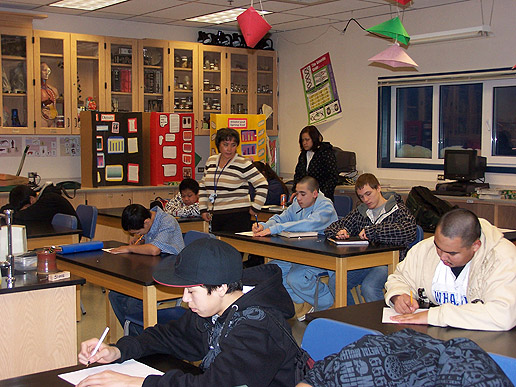 |
| Kids. Love. School. |
Back to school. Most kids don't say anything: they ask no questions, offer no suggestions — nary a comment. What I mean to say: students (and I'm speaking of your 15-17 year old crowd) are far less inquisitive in the classroom than my tastes would prefer.
I'm quite sure there are many explanations. Maybe someone, somewhere, has even looked into it, launching an official inquiry. I have very little to add:
I see teachers... entire lots of em'. Many (hell, maybe even most) are not adequately armed to battle wits with your average 16 year-old. This is very obvious to me. Now, you might think: teachers who have the "intellect" to satisfy the questions of adolescents are the same teachers who produce the talking kids. Or, a teacher who can/will answer questions thereby encourages kids to ask more questions. I'm not so sure. Here's why teachers, both wise and not, tend to fail:
Vapid teacher, can't handle the students' fiery lumber rooms
Two common postures in relation to student questions
a) Swing and miss: By golly they mean well, they just don't have it in them.... forgiven. Not being able to offer a stylistically compelling and/or logically "effective" argument in response to the quizzical nature of a child leaves the not-too-smart teacher as little more than a cheerleader, which is nice, I don't mean to dismiss.
b) Be a dick about it: Perhaps you've seen the type? They'll either tell the kid something along the lines of
you're being a distractionOR
I don't have time to answer every question, we have a lot of work to do (which is, obviously, a lie)Astute teacher, or at least smart enough to outpoint most teenagers — what do they do wrong?
a) Hit it out of the park: It is tempting — because showing off can be fun — to give a 10 minute rejoinder to something like, "what's McCatheryism?" The answer far exceeds the scope of the question, the student has a can you shorten that to one sentence, please expression scrawled on her face — understandably so.
b) Be a dick about it: Kids (like adults) can be — and often are — annoying and petty and it can be fun for a teacher to thrash the rascals when vulnerable. Perhaps this is unsettling? So it goes... I've certainly done it (which I'm not terribly pleased to tell you, but it is so).
When that kid (your villain) gives you an opportunity to ridicule — or if you're in the mood for a euphemysm, replace ridicule with humble — them for being such a little shitbag... well, the decision happens so quickly, it's almost as if you can't hold yourself accountable for taking the low road (wink with me).
These brilliant examples illustrate how teachers convince kids, through rigorous repetition, that it isn't worth the trouble to engage the teacher in conversation: why bother saying anything — it'll just leave you unsatisfied.
One possible solution, if you think silent students is a problem: Find teachers with classroom personas that lean toward theatrics and at times frivolous play — this can help. The appeal of feeling like you're "part of the show" seems to induce people towards action, the kids start thinking and yapping. Also, exuberance demands a strange respect, it's almost like fear — that's useful.
No comments:
Post a Comment